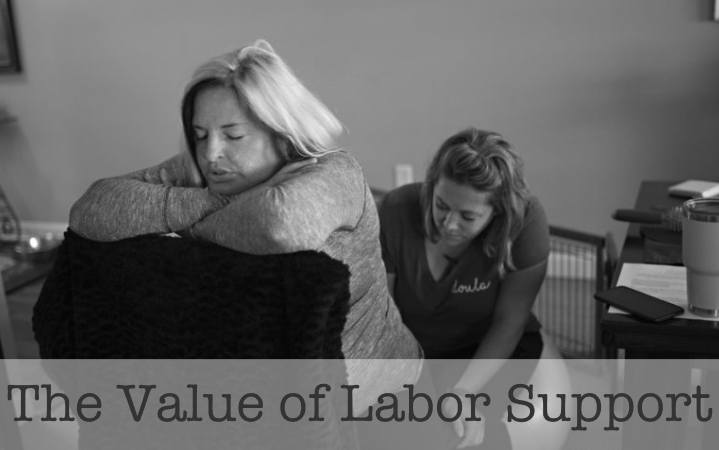The American Congress of Obstetricians and Gynecologists (ACOG) stated, “Evidence suggests that, in addition to regular nursing care, the continuous one-to-one emotional support provided by support personnel, such as a doula, is associated with improved outcomes for women in labor” (Hodnett, Gates, Hofmeyr, & Sakala, 2013). Labor support during pregnancy has been shown to reduce the length of labor, reduce the need for medication during labor, and even reduce the cesarean rates. Having labor support also boosts the self-confidence of expectant parents.
In a study done by five researchers from the Department of Pediatrics, they found “the continuous presence of a supportive companion (doula) during labor and delivery in two studies in Guatemala shortened labor and reduced the need for cesarean section and other interventions” (Kennell, et. al., 1991). Many times women are afraid of delivery. They are afraid of the pain from the contractions and the pain of pushing the baby through their birth canal and out of their vagina. The purpose of labor support is to keep the expectant mother calm and relaxed. If the mother understands what her body is doing during labor, and is coached to focus on the moment and not the overlying fear, she is less likely to tense up during contractions and more likely to breathe through each one, allowing the contractions to become waves and pulling the baby down through the birth canal. Any time a mother is tense, her body is not able to work the way it needs to for delivery. The mother’s tension causes her muscles to stay tight and her body will have a very hard time allowing the baby to drop into the birth canal. Once the mother is reminded by the labor support to relax through each contraction, her body will be able to proceed and the labor will progress more quickly.
The main goal of labor support is to keep the mother relaxed and calm, as stated above. The fear of childbirth can sometimes overwhelm the mother causing her to immediately ask for medication. Sometimes, mothers have been told by other family members or friends to ask for medications regardless of their pain level. Unfortunately, there are many side effects of medication during labor. Some medications can cause drowsiness in the mother, not allowing her to push when her body is ready, and it can even pass through to the baby and keep the baby from moving through the birth canal as it should. It has also been a concern that medication given to the mother for labor pains has caused their babies to have lower five-minute Apgar scores. During the study Hodnett et. al. (2013) completed, they found that the babies of women who received medication had lower five-minute Apgar scores than the babies of women who had labor support and did not receive medication. If the mother is calm and relaxed, her pain will not be as high and she will be able to focus on the contractions as they come, rather than the fear of the contractions. With labor support, the statistics have shown that fewer women ask for pain medication. The study discussed above, done by Hodnett et. al. (2013), showed there was a 9% decrease in the request for pain medication.
In addition to the shorter labor times and reduced need for pain medication, continuous labor support also reduces the risk of cesareans. Not every time but many times, cesareans are needed because the mother has stopped dilating or the mother and/or baby have become so stressed, or tired, their heart rates may drop. With continuous labor support, the mother will be more relaxed allowing the baby to stay calm. The labor support is also able to remind the mother to move into different positions which helps with dilation and bringing the baby down into the birth canal. It’s been proven that gravity helps bring the baby down. If the mother has labor support helping her change positions walk around, or even squat, a lot of the time the labor will progress as needed and a cesarean will not be needed.
Childbirth is a very scary and exciting event for all expectant parents. Sometimes the medical staff will say something using acronyms and the parents are not sure what they’re referring to. The medical stay may even speak about a medical procedure the expectant parents are not familiar with. Having someone on your labor team that is familiar and trained with medical terminology is extremely helpful. The labor support can immediately explain to you what the medical staff is referring to and that allows the parents to have the knowledge needed to not be afraid. It allows expectant parents to have the self-confidence they need to advocate for their babies and how their labor and delivery experience will go.
Evidence has shown that it is very important for expectant mothers to have continuous labor support during their labor and delivery for many reasons. By having a shorter labor time, reduced need for pain medication, less chance of having a cesarean, and more self-confidence, the expectant parents are able to bond together more while bringing their bundle of joy into the world, allowing them to have a lesser chance of being faced with medical emergencies. Since hospital births have become routine, births have been treated more like medical procedures rather than a natural part of life. Having labor support helps alleviate the medical procedure and turns it back into a more natural approach.
References
Hodnett ED, Gates S, Hofmeyr GJ, Sakala C. Continuous support for women during childbirth. Cochrane Database of Systematic Reviews 2013, Issue 7. Art. No.: CD003766. DOI: 10.1002/14651858.CD003766.pub5.
Kennell J, Klaus M, McGrath S, Robertson S, Hinkley C. Continuous emotional support during labor in a US hospital. A randomized controlled trial. JAMA 1991;265:2197–201.

